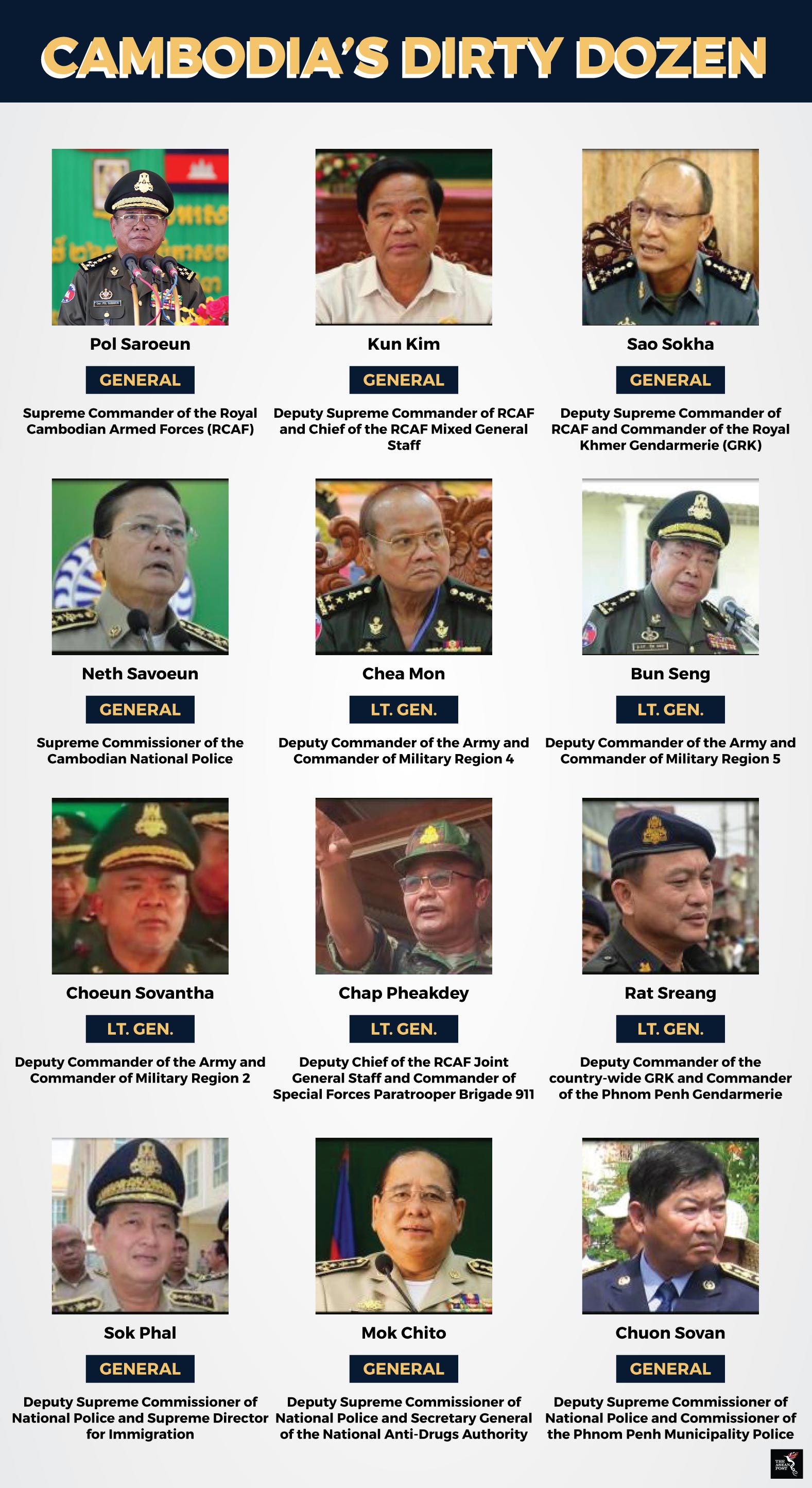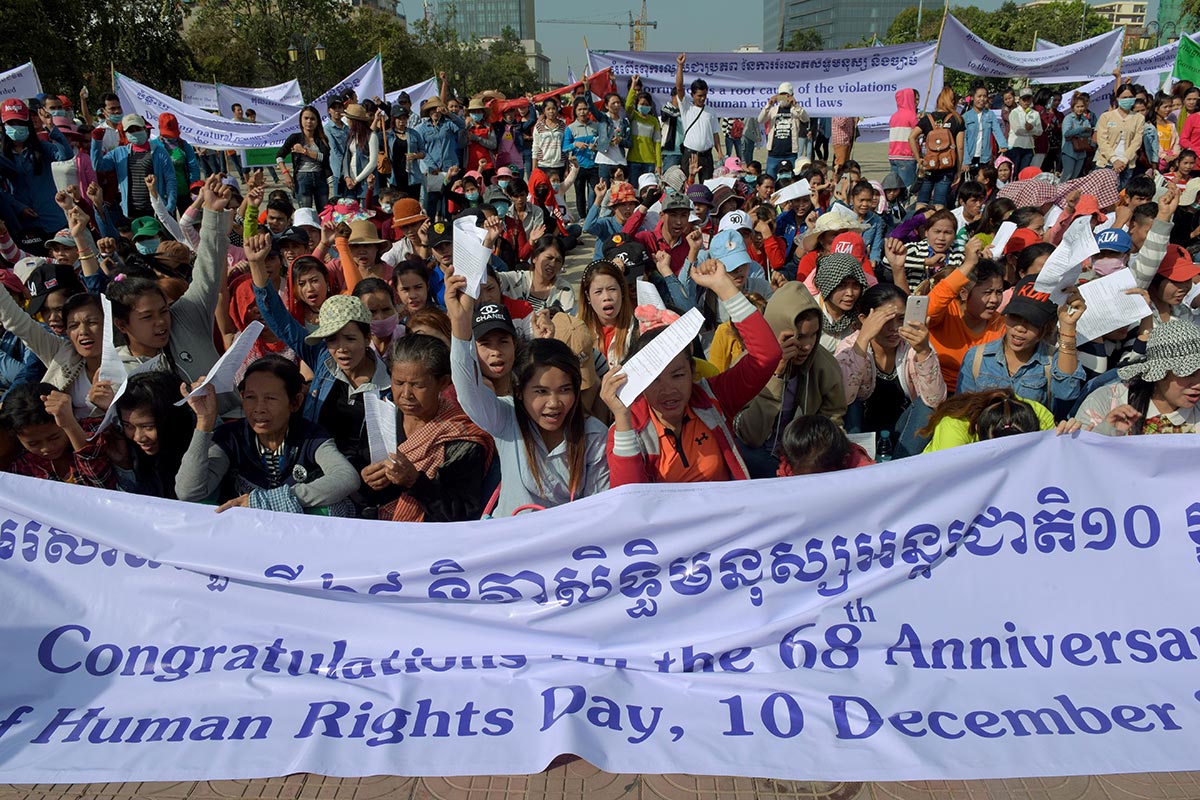Cambodian premier, Hun Sen who has held on to power for over 30 years, is now a “fully fledged military dictator” according to a new report by the Human Rights Watch (HRW). The report also highlighted the entrenched militaristic ties that Hun Sen has nurtured and developed with 12 individuals that became the “backbone” of his autocratic regime. These men, all have close political ties with their leader and help him ensure the army and police continue to facilitate the Cambodian People’s Party’s (CPP) near perpetual rule.
The story of political oppression in Cambodia traces its roots back to the Khmer Rouge era in the 1970s. The New York based human rights advocacy group stated that all 12 of these military men have been implicated in some way or form of human rights abuse ranging from land confiscations to the use of lethal force against protestors. Some of them even participated in the atrocities of the ruthless Pol Pot regime between 1975 to 1979.
Dirty dozen
Two army generals, Pol Saroeun and Kun Kim were members of the Khmer Rouge security apparatus with Hun Sen. Lieutenant generals, Chea Man and Choeun Sovantha were also previously closely associated with the dictatorial ruler. Generals, Sok Phal, Kum Kim and Neth Savoeun grew cosy with Hun Sen in the early 1990s and lieutenant general, Chap Pheakdey played a key role in Hun Sen’s 1997 coup which resulted in dozens of fatalities. Besides that, lieutenant generals, Chuon Sovan and Rat Sreang were both originally protégés of Kun Kim and in time, became linked to Hun Sen.
All 12 serve as somewhat personal bodyguards to Hun Sen and owe their senior positions in the country’s security forces to him. The allegiance to Hun Sen is evident in their willingness to commit atrocities for him to the extent of extinguishing the lives of Hun Sen’s political opponents. Throughout their careers, they have earned relatively modest salaries from serving in the government yet have amassed large amounts of unexplained wealth. All are members of the CPP central committee which is the highest policy making body in the country.
Dead end democracy
Hun Sen’s final nail in the coffin of his detractors came at the end of last year when the courts – which are under his thumb – ruled for the dissolution of the opposition Cambodian National Rescue Party (CNRP). The CNRP had made significant inroads in previous local elections and were poised to mount a strong challenge to the CPP in the upcoming July general elections.

Source: Human Rights Watch
Thanks to the support of “a cadre of ruthless members of the security forces”, Hun Sen has managed to affirm his grip on power and will likely do so, going forward. The CNRP is essentially finished and the remaining opposition political parties are mostly either disenfranchised or aren’t strong enough to remove the CPP from government.
In their report, the HRW also highlighted several recommendations of actions for concerned international actors like governments and donors to take, in light of the situation in Cambodia. Among others, were the imposition of travel bans and asset freezes for corrupt, high-ranking officials, to offer support for Cambodian civil rights organisations and to address rights abuses to Phnom Penh via government-to-government avenues.
While steps like these have been taken before, most recently by aid cuts from the United States (US) in February this year, it has had little to no impact on Hun Sen’s hold on power. This is primarily because he has shifted his foreign policy posture and is now reliant heavily on Chinese foreign aid. As of April 2017, Beijing’s financial commitments to Cambodia in terms of grants and loans reached a combined total of US$4.2 billion. Chinese investment has also funded 70 percent of Cambodia’s infrastructure network of roads and bridges.
Hun Sen doesn’t hide his dislike for western powers; even openly daring the US and European Union (EU) to freeze the wealth of Cambodian leaders abroad. Last year, Phnom Penh in retaliation to Washington’s cancellation of a nine-year humanitarian programme conducted by the US military, pulled out of the annual “Angkor Sentinel” joint military exercise. Meanwhile, Cambodia has increased military cooperation with China and even partook in the inaugural “Golden Dragon” military exercise back in 2016.
Hun Sen, whose dictatorial ways are becoming more conspicuous by the day is set to hold on to power indefinitely as the status quo is expected to continue after Cambodians head for the polls next month. If his official title in Khmer, “Samdech Akka Moha Sena Padei Techo Hun Sen,” which translates to “princely exalted supreme great commander of gloriously victorious troops” is anything to go by, it is clear that he intends to cement his rule and stifle democracy in Cambodia for as long as possible.
